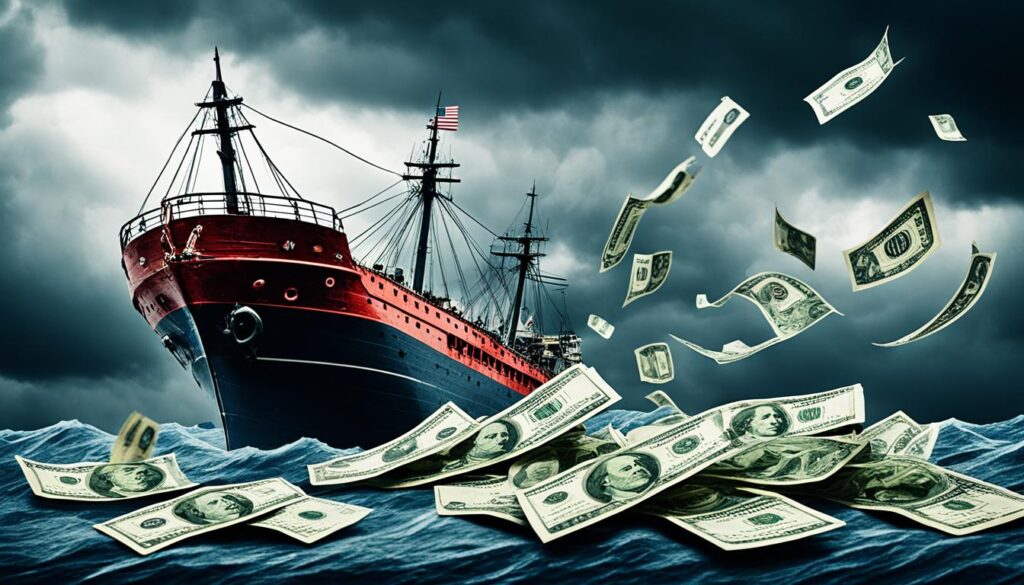Welcome to my article on currency wars. Here, we’ll see how political decisions can change exchange rates. Currency wars are a big deal in the world economy today. Countries use strategies to boost their economies and get ahead in international trade.
A currency war happens when countries lower the value of their money against others. They do this to make their products cheaper and more appealing worldwide. However, this can lead to problems like inflation and expensive imports, which hurts buyers. It can also cause more protectionism and trade walls, damaging the world’s economy.
This article will look at how currency wars begin and their bad effects. It’s important for businesses and individuals to understand how these wars affect currency values and exchange rates. Being aware can help them navigate these tricky waters.
Key Takeaways:
- Currency wars involve nations devaluing their currencies to stimulate their economies and make exports more competitive.
- These devaluations can lead to unintended consequences such as inflation and increased protectionism.
- Understanding the dynamics of currency wars is crucial for businesses and individuals affected by currency fluctuations.
- Currency wars can result in trade barriers that hinder global trade.
- Policymakers should consider the long-term effects of currency devaluation and prioritize sustainable economic growth.
How Does Currency War Start?
Currency values change based on market forces in today’s world. But, a country’s central bank can lower its currency’s value on purpose. They do this through economic strategies.
Currency devaluation is one way to do this. It means making a country’s currency worth less compared to others. This helps to boost exports and gives a country an edge in global trade. Exports become cheaper abroad, aiming to grab a bigger market share and grow the economy.
Interest rates are also used to tweak currency values. Lowering interest rates makes borrowing money cheaper. This encourages spending and can make the currency more valued. On the flip side, higher interest rates can do the opposite, making the currency less valued.
Quantitative easing (QE) is another method central banks use for growth. It means buying large amounts of government bonds or other assets. This action puts more money into the economy, lowering interest rates and weakening the currency. This helps with boosting exports.
“Currency wars can start when nations use these monetary policy decisions to devalue their currencies and gain a competitive advantage in global trade.”
Modern currency wars are complex. In the past, countries directly intervened in the market to change their currency’s value. Now, the actions of investors and companies also play a role. This adds complexity to currency wars.
Understanding currency devaluation, interest rates, and QE helps us see how currency wars begin. This knowledge shows why these wars impact global trade and economic stability.
The Role of Political Factors
Political factors also start currency wars, not just economic strategies. Leaders may devalue their currency because of bad trade balances, external shocks, or to protect local industries.
Political motives can sway decisions on interest rates and QE. Sometimes, politicians push central banks to act in ways that help them politically, like boosting the economy before an election.
It’s important to look at how economic and political factors interact. This gives a full picture of currency wars and how they work.
Negative Effects of a Currency War
If a country lowers its currency value, it might help its exports at first. But this can lead to inflation if the currency falls too much. Prices go up and money might leave the country.
A fight over currency values can make countries want more protectionism and set up trade barriers. This slows down worldwide trade. When a currency is worth less, buying things from other countries gets harder.
| Inflation | Protectionism | Trade Barriers | |
|---|---|---|---|
| Definition | Inflation refers to the general increase in prices and the fall in the purchasing power of money. | Protectionism is the practice of imposing restrictions on foreign trade to shield domestic industries from foreign competition. | Trade barriers are government-imposed restrictions that hinder the free flow of goods and services between countries. |
| Negative Impact | Causes rising prices and capital outflows, which can harm consumers and investors. | Leads to reduced international trade, limiting market access and potentially stifling economic growth. | Hinders the exchange of goods and services between nations, reducing efficiency and increasing costs for businesses. |
| Example | When a nation’s currency is devalued, imported goods become more expensive, increasing the cost of living for citizens. | A country implementing protectionist measures may impose high tariffs on imported goods, making them less competitive in the domestic market. | Introducing trade barriers such as quotas or import restrictions can restrict foreign competition and favor domestic industries. |
| Consequence | Inflation erodes the purchasing power of individuals and may disrupt a stable economic environment. | Protectionism can lead to retaliatory measures from other countries, escalating trade tensions and reducing global economic cooperation. | Trade barriers limit market access, decrease consumer choice, and impede economic growth. |
Conclusion
Currency wars are a tough challenge shaped by political decisions to lower currency value. Nations do this to boost their economy and make their goods cheaper abroad. But, these steps can backfire.
They can lead to higher prices, more calls for trade protection, and set up trade blocks. This can slow down global trade.
Leaders must think about the long-term results of lowering currency value. They should focus on ways to grow the economy that last. Knowing how currency wars work is key for businesses and people affected by changing currency values and exchange rates.
When dealing with currency wars, countries must find a balance. They should aim for actions that bring stability and encourage teamwork. This can help lessen the bad effects of currency wars on the world’s economy.
FAQ
What is a currency war?
How do currency wars start?
What are the negative effects of a currency war?
Source Links
- https://www.investopedia.com/articles/forex/042015/what-currency-war-how-does-it-work.asp
- https://www.spglobal.com/marketintelligence/en/mi/solutions/primer-currency-wars-and-foreign-exchange-manipulation.html
- https://www.brookings.edu/articles/what-did-you-do-in-the-currency-war-daddy/
Disclaimer
All information on this website is of a general nature. The information is not adapted to conditions that are specific to your person or entity. The information provided can not be considered as personal, professional or legal advice or investment advice to the user.
This website and all information is intended for educational purposes only and does not give financial advice. Signal Mastermind Signals is not a service to provide legal and financial advice; any information provided here is only the personal opinion of the author (not advice or financial advice in any sense, and in the sense of any act, ordinance or law of any country) and must not be used for financial activities. Signal Mastermind Signals does not offer, operate or provide financial, brokerage, commercial or investment services and is not a financial advisor. Rather, Signal Mastermind Signals is an educational site and a platform for exchanging Forex information. Whenever information is disclosed, whether express or implied, about profit or revenue, it is not a guarantee. No method or trading system ensures that it will generate a profit, so always remember that trade can lead to a loss. Trading responsibility, whether resulting in profits or losses, is yours and you must agree not to hold Signal Mastermind Signals or other information providers that are responsible in any way whatsoever. The use of the system means that the user accepts Disclaimer and Terms of Use.
Signal Mastermind Signals is not represented as a registered investment consultant or brokerage dealer nor offers to buy or sell any of the financial instruments mentioned in the service offered.
While Signal Mastermind Signals believes that the content provided is accurate, there are no explicit or implied warranties of accuracy. The information provided is believed to be reliable; Signal Mastermind Signals does not guarantee the accuracy or completeness of the information provided. Third parties refer to Signal Mastermind Signals to provide technology and information if a third party fails, and then there is a risk that the information may be delayed or not delivered at all.
All information and comments contained on this website, including but not limited to, opinions, analyzes, news, prices, research, and general, do not constitute investment advice or an invitation to buy or sell any type of instrument. Signal Mastermind Signals assumes no responsibility for any loss or damage that may result, directly or indirectly, from the use or dependence on such information.
All information contained on this web site is a personal opinion or belief of the author. None of these data is a recommendation or financial advice in any sense, also within the meaning of any commercial act or law. Writers, publishers and affiliates of Signal Mastermind Signals are not responsible for your trading in any way.
The information and opinions contained in the site are provided for information only and for educational reasons, should never be considered as direct or indirect advice to open a trading account and / or invest money in Forex trading with any Forex company . Signal Mastermind Signals assumes no responsibility for any decisions taken by the user to create a merchant account with any of the brokers listed on this website. Anyone who decides to set up a trading account or use the services, free of charge or paid, to any of the Broker companies mentioned on this website, bears full responsibility for their actions.
Any institution that offers a service and is listed on this website, including forex brokers, financial companies and other institutions, is present only for informational purposes. All ratings, ratings, banners, reviews, or other information found for any of the above-mentioned institutions are provided in a strictly objective manner and according to the best possible reflection of the materials on the official website of the company.
Forex/CFD trading is potentially high risk and may not be suitable for all investors. The high level of leverage can work both for and against traders. Before each Forex/CFD investment, you should carefully consider your goals, past experience and risk level. The opinions and data contained on this site should not be considered as suggestions or advice for the sale or purchase of currency or other instruments. Past results do not show or guarantee future results.
Neither Signal Mastermind Signals nor its affiliates ensure the accuracy of the content provided on this Site. You explicitly agree that viewing, visiting or using this website is at your own risk.




